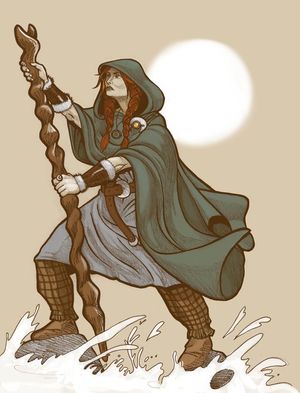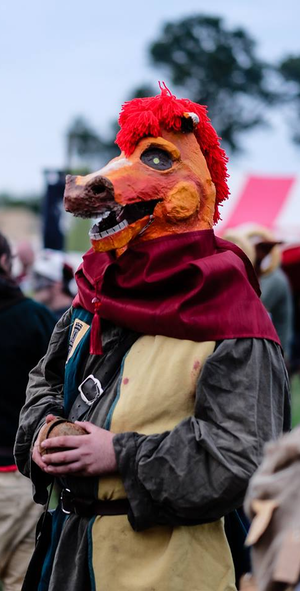The Marches magical traditions
A Landskeeper is anyone who uses magic to support the territories or the nation as a whole. The vast majority of Landskeepers form groups of their own, called circles, and keep a certain amount of distance from other Marcher folk. They view the Marches as their charge, and their ultimate responsibility is to the people of a territory as a whole rather than to any individuals. While they often claim to disdain politics, most Landskeepers support the status quo and take the long view of events.
The Landskeepers support the Marcher armies in wartime, providing magical enchantments to protect and empower the soldiers of the Marches, as well as healing the injured. Landskeepers act as they will in the service of what they perceive as the greater good, and they have a great deal of freedom to take unpopular action.
Part of their strength, and their ability to operate as they see fit, comes from their control of the magical dolmens that stand throughout the Marches. In addition to strengthening the Landskeepers, these great stones anchor powerful enchantments that enhance the fertility of Marcher soil. Households who oppose the Landskeepers risk losing their magical support and even their very prosperity. In turn Landskeepers who disrespect the households are striking against the fabric of Marcher society that they are generally assumed to be protecting
The Landskeepers do not look well on the new fashion for market towns, a departure from the old ways that the majority have opposed at every turn. The Aldermen of the market towns tend to have little appreciation for the work of the Landskeepers, and their politically protected status makes them hard to influence. Some Landskeeper circles have reached an accommodation with the market towns, but these are usually cautious and shaky associations.
Finally, Landskeepers deal with the Eternals. Most have a deep suspicion of these creatures, which have complex and inscrutable agendas of their own. Most prefer to deal with the Heralds, the human-like servants of the Eternals with whom it is easier to reach a compromise or mutually beneficial accommodation. Places where Heralds appear are often marked with standing stones.
Sorcery and the Threshers
Someone who is suspected of using magic in ways that violate Marcher traditions faces shunning or worse. The Declaration of Sorcery used by the Imperial Conclave was originally a Marcher idea. The Landskeepers could judge fellow magicians accused of misusing their magic, declaring them to be sorcerers and punishing them for their misdeeds.
There is a common belief in the Marches that all magic should be done publicly. Only sorcery is done in private - "dark minds find dark places to do dark deeds" so the saying goes. That is not to say that every magical ritual requires an audience, but the more effort the practitioners make to keep people from seeing what they are doing, the more suspect their magic must be.
Some Marchers dedicate themselves to tracking down, exposing and destroying sorcerers wherever they may operate. They are called Threshers and they watch for things that are wrong. Every farmer knows about separating wheat from chaff, and the Threshers look to separate human wheat from human chaff. They seek out those who are using magic or old lore against the interest of the people. Where crimes are being committed they work with the beaters and Landskeepers to capture the sorcerer and hand them over to Imperial justice. If the sorcerer has not broken any Imperial laws then the rough music is their punishment, or shunning if they persist. It falls to the Thresher to convince the folk of the Marches that these punishments are merited, and in many cases to oversee their performance.
Several Threshers expand their interests to include the rest of the Empire, looking for villains outside the borders of the Marches whose wickedness threatens - or may eventually threaten - the innocent folk of their Nation. These Threshers have an interests in groups such as the circle of sinister sorcerors called the Volodny, or the most powerful barbarian shamans, who threaten the Marches by dint of the threat they present to the entire Empire.
Mummers
Some Marcher magicians practice dramaturgy, and join together in bands of mummers. They tend to maintain an itinerant existence combining the practice of ritual magic with entertainment. Traveling from place to place freely, they attend fairs, markets and other regular gatherings performing plays and feats of skill. They are often greeted with a little suspicion - compared by some uncharitable souls to the mountebanks of the League. Some market towns observe local ordinances that ban mummers from spending the night in their environs.
Mummers pride themselves on working magic through improvisation, without scripts but with a strong intuitive feel for the stories they create and the roles they use to work their magic. The personae are usually presented with a single key prop rather than a mask or sumptuous costume, while the thrones are generally established by narration rather than through expensive - and unwieldy - scenery. Almost all groups of mummers include the fool as a major character, weaving narration and commentary through the performance as the personae act out the events he or she describes - the fool is also responsible for encouraging audience participation and attracting patrons prepared to pay a few coins for the magic or entertainment the mummers provide. In contrast to League dramaturgists, the fool is often the only member of the band who wears a mask.
Their plays are often rough and full of broad humour, but no less effective at providing entertainment or instruction for all that. It is quite common for bands of mummers to have a broad mastery of ritual lores rather than to focus in any one lore - many pride themselves on mastering the four rituals that allow a [[farm[[ to be enchanted through the year. They use the opportunity of seasonal fairs to stage grand performances that enchant all the farms in the vicinity usually for a suitable donation from the yeomen who own those farms.
The tradition clearly has roots in the Dawnish traditions of the guisers.

